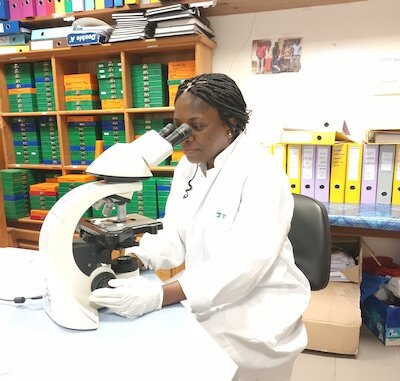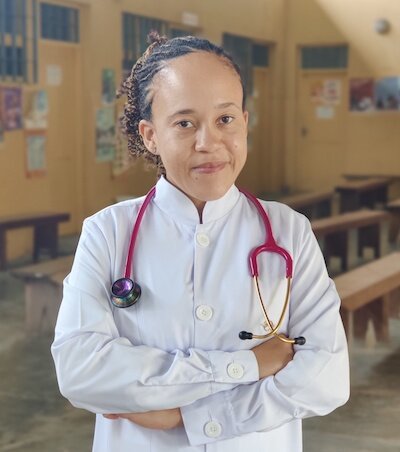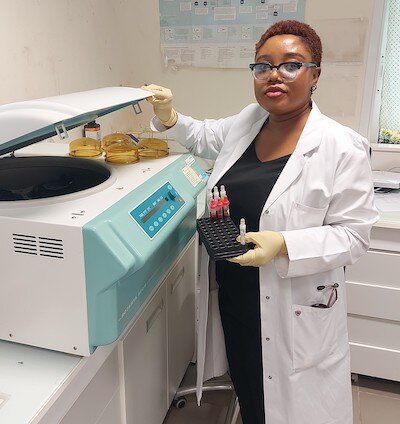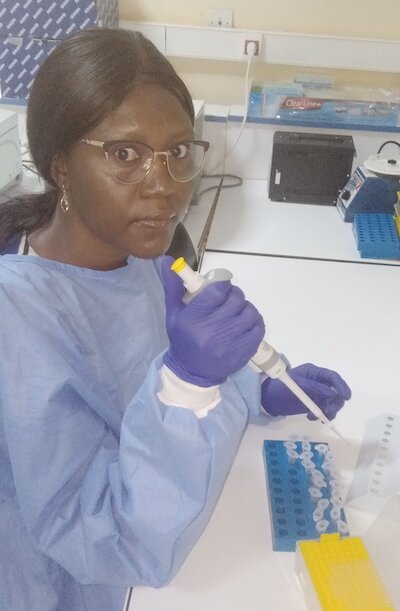Celebrating International Day of Women and Girls in Science 2024

Emma Gladis Malinga is a biologist and researcher at CERMEL, a leading African medical research and training centre in Gabon. She is a PAMAfrica scholarship recipient pursuing a PhD at the University of Tübingen (Germany) and conducting research on the clinical profiles of certain hematological and biochemical parameters of uncomplicated malaria infections, loa loa and schistosomiasis, before and after the treatment of patients admitted to CERMEL, Gabon.
Emma, how is your research contributing to the broader malaria elimination agenda?
My research aims to contribute to the knowledge of antimalarial drug safety in the context of distinguishing drug-related complications from those related to malaria infections in patients. My work will support the investigation of side effects, both during and at the end of treatment.
Your work is addressing the need to improve treatments and outcomes for malaria patients. Why is this so important to you?
Given the urgency of treating severe malaria to avoid mortality, it is imperative to improve drug efficacy. As such, rapid and effective treatment remains a primary research challenge to reduce morbidity and mortality.
Tell us about your experience as a woman in science. What’s your message to girls and other women dreaming of pursuing a career in science?
For me, although I aspired to study science for a long time, my integration into research was done gradually. Working in a research environment has given me the opportunity to integrate and understand that both sexes can get involved in research. I have the will and courage, and today I am determined to go further, even with my family responsibilities. I believe I can find the right balance to be a wife, a mother and a researcher. You just have to dare!
I would like to tell women and young girls that science is also for women, and ultimately requires the involvement of women to move forward. Research is an exciting world, a world of reflection, and a world that is open to everyone. Let your minds be seduced by research.

Dr Jessica Dalsuco is a medical researcher at the Manhiça Health Research Centre in Mozambique and currently serves as a Principal Investigator for the SINDOFO Consortium. She is also a SINDOFO scholarship recipient currently pursuing her PhD in Translational Medicine and Research at the University of Barcelona.
Jessica, tell us about the research you are currently conducting and its connection to the malaria elimination agenda.
I am currently working on a clinical trial for the development of a new drug combination for the treatment of malaria, focused on children under 5. Although effective antimalarial drugs for the treatment of malaria in this vulnerable group already exist, the emerging resistance of the malaria parasite to these drugs makes it urgent to develop a new generation of antimalarial drugs with different modes of action. This study will help reduce malaria morbidity and mortality.
Why is improving treatment outcomes for malaria patients, especially among the most at-risk, so important to you?
Malaria is a potentially deadly disease, especially in the African region, which, according to the 2023 World malaria report, accounts for 95.4% of malaria deaths worldwide. Moreover, 78.1% of all deaths in this region occurred in children under 5 in 2022. Improving the treatment of the disease will help prevent an increase in the number of deaths from malaria and ultimately drive this number down.
What are your thoughts on promoting access to science for women and girls?
Women are still underrepresented in the field of science; only 31.2% of researchers globally are women, and the figure is even lower when it comes to leadership positions. The challenges faced by us women in society are a barrier, but women should be encouraged to pursue scientific careers and occupy leadership positions. This would promote gender equality; innovation in science, technology and engineering; and even in the development of countries' economies.
It is important to note that various efforts have been made to include and motivate the participation of women and girls in science through programmes and nominations that offer prizes to encourage and promote the contribution of women in the field of research. Nevertheless, opportunities for capacity building and training of these same women/girls must be created so they can develop their skills and gain greater confidence and autonomy when exposed to leadership roles and research positions.

Dr Dearie Glory Okwu is a research physician at the CERMEL research institute in Gabon and Principal Investigator for clinical trials taking place in the context of the SINDOFO Consortium. She is also a SINDOFO scholarship recipient and intends to pursue her PhD at the Bernhard Nocht Institute for Tropical Medicine in Germany.
Dearie, tell us about your work and how it contributes to the broader malaria elimination agenda.
In a time when fever is generally classified as malaria in rural areas, antimalarials are dispensed without proper diagnosis. And even with the right diagnosis, people begin a treatment regimen and stop after day two because they feel better, or treatment is shared among siblings due to limited resources. There is a need for continuous community outreach programmes that reiterate the importance of compliance with treatment regimens, promoting proper diagnosis through the use of Rapid Diagnostic Tests before starting treatment, advocating for free and accessible test kits, providing affordable medicines and most importantly, providing access to primary healthcare in remote rural areas.
I am a research physician at the CERMEL research institute with MED4PRID (Medicines for Poverty-Related Infectious Diseases). We are involved in several phase Ib/II/III clinical trials to identify a new antimalarial combination. With the emergence of resistance in certain regions to current first-line therapy (Artemisinin-based Combination Therapies – ACTs), we need to be proactive in finding a new drug from a different class that is rapid-acting, and if possible, with a one-day parasite clearance to promote compliance.
Why is your work to improve treatment outcomes for malaria patients so critical?
According to the Country Disease Outlook of WHO in 2023, Gabon has had a steady incidence rate of malaria cases since 2015 and a mortality rate of 384 deaths, with over 500,000 cases in 2021. Improving malaria treatment would reduce the burden on the healthcare system during peak transmission season, which is the rainy season. Poor treatment outcomes result in prolonged absences at work and in rural regions; this could have drastic effects on the family unit as a whole if the affected person is the breadwinner. In younger populations, with missed school days, they begin lagging behind in their schoolwork and this affects the opportunities available to them in the long run.
What are your thoughts on promoting access to science for women and girls? And what about your own experience?
Giving more women and girls access to science would inspire even more young women to envision the possibilities available to them. The power of representation and seeing people who look like you not just occupying places of power in science, but also making positive changes, cannot be underestimated. In certain regions of the world, access to education for women and girls still poses a problem. However, with the improvement in access to education, we need more avenues for scientific research and careers in science for women and girls.
I work as an Investigator and a Co-PI in projects under PAMAfrica and this opportunity has been tremendously life changing. I have had the opportunity to see the behind-the-scenes workings, be part of decision-making processes and take the lead on malaria elimination research.

Tiampan Edwig Traore is a researcher at CRUN, a clinical research centre in Burkina Faso. She was awarded a PhD scholarship from SINDOFO in 2022 through CRUN, and focuses her research on the contributions of next-generation sequencing tools to malaria molecular surveillance in a high and seasonal transmission setting in Burkina Faso.
Edwig, can you talk about your current research and how it contributes to the malaria elimination agenda?
As a PhD Student, I am working on molecular surveillance of antimalarial drugs resistance markers in Burkina Faso, especially assessing the evolution of resistance markers against drugs used for preventive treatments in children under five years old and pregnant women, using next-generation sequencing tools. My research is also related to a project assessing the efficacity of two new preventive treatments in school-aged children, among whom I will investigate immune response profiles. Since WHO recommends the use of seasonal malaria chemoprevention (SMC) and Intermittent preventive treatment using sulfadoxine-pyrimethamine (IPTp-SP) in children under five and pregnant women respectively, and considering the increase of resistance markers prevalent to these drugs, it is important to regularly monitor these markers to inform national malaria programmes.
Regarding preventive treatment in school-aged children, WHO has recently recommended this strategy to reduce malaria cases and transmission in this age group, but without indicating which drugs to use. This is why a study known as “IPTSc-malaria consortium” at CRUN aimed to assess two treatments for IPT in school-aged children. My PhD activities will help to assess the efficacy of these drugs and help to choose the one best-suited to prevent malaria transmission.
How will your research improve treatment outcomes for malaria patients?
For monitoring resistance markers and assessing drug efficacy, my results will first guide the choice of effective preventive treatment. This will allow patients to avoid malaria transmission or severe cases, as the disease is endemic in Burkina Faso. It will also reduce malaria deaths and expenses related to malaria drugs. Secondary, thanks to the AmpliSeq panel I will use for sequencing, I will be able to monitor resistance markers associated with artemisinin and its partners used in ACTs. This will offer insights into the effectiveness of the current drugs used for malaria case management.
Why do you think it’s so important to promote access to science for women and girls?
Doing research takes a lot of time and demands a lot of work, which makes women and girls hesitant to undertake because they already have a lot of domestic work to do, especially in African societies where these activities (taking care of the home, cooking, taking care of children, etc.) are carried out by women. Consequently, many women do not think they could be able to combine research activities with what they already have in terms of daily activities.
Some women and girls also think that research is very difficult and complicated. So, to promote access to science for women, institutions must consider these parameters when recruiting women and be more flexible with them. When launching scholarships, institutions or funders should also establish a quota for women and encourage them to apply because they have the intellectual capacity and meticulousness that is essential in research. Promoting women in science will reduce the existing gap between men and women in science. Personally, I am passionate about being a researcher and am doing my best to succeed. Now that I have started down the path of research, I am realizing that it is not as complicated as it first seemed and it is possible to combine research with my domestic work. Also, my institution supports me in my activities and has given me access to the SINDOFO scholarship. I encourage women to express the will and have the determination to do research.




